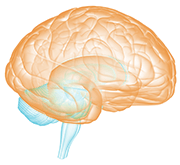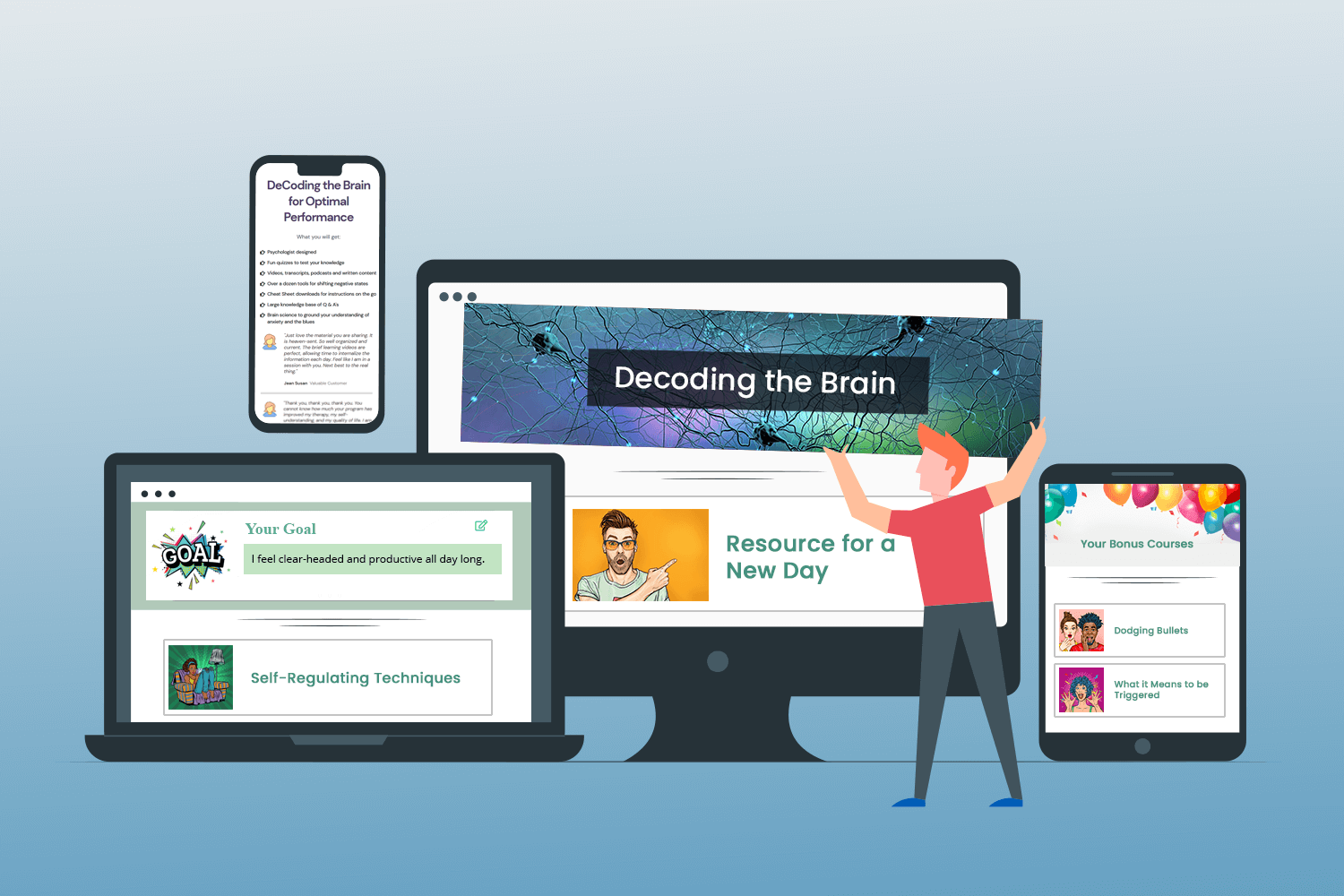"Yeah, I'm done with this."
If you can't handle one more thing, is it possible that it's not the "things" you're dealing with, that's causing the overwhelm?
That would change everything would it not?

Author: 20-Year Veteran Psychologist and Consultant Dr. Susan LaCombe
Dr. LaCombe is a passionate advocate about leveraging the nervous system to increase resiliency and emotional balance.

Rewire the brain to handle more — while feeling it less.
Can't handle one more thing?
If you're feeling maxed - and you notice that it doesn't take much to set you off - consider that your nervous system is not working optimally. It's lacking resiliency.
Most people don't think in terms of their "nervous system" when it comes to how they well they're coping. And even though the nervous system is the top of the pyramid in terms of controlling your emotional capacity - it's considered 'set in stone'.
Far from the truth. We now know you can directly work with the nervous system and change it at its core.
Today we must learn to adapt constantly
Seems like there's no shortage of having to learn new things. (uhm, did someone say Covid?)
Yeah, if there's one thing we can be certain of...it's that change is inevitable.

I was fumbling with my computer the other day trying to figure out the changes to my desktop with Mac's new operating system.
Go back 10 years and you'd be watching a scene out of Seinfeld where George is having a conniption.
If you find it hard to say "bring it on" to changes at work or to new technology, maybe your nervous system needs some help to roll with the punches.
Where would you find such a thing? Why therapy of course!![]()
Now, few people choosing to go to therapy would say "I want to be more resilient." However you might hear them say...
"I don't seem to bounce back"
or
"I'm not your 'go-with-the-flow' kind of person"
Resilience gives you that capacity to respond easily to the changes in your circumstances. It helps you to let things go and move on.
Without resilience you tend to end up in a rut.
"Resilience is the maintenance of high levels of positive affect and well-being in the face of adversity.
It is not that resilient individuals never experience negative affect, but rather that the negative affect does not persist.
Dr. Richard Davidson1
A new way of looking at 'resilience'.
The exciting news is that the capacity of your nervous system can be dramatically improved upon.
Yes, your resiliency to stress and emotional upheavals can be modified - without drugs.
Yet, one decade later after this most astounding discovery, many people continue to think of resilience as something that's static and modifiable only by genetic manipulations.
In fact, most people believe resiliency is a mental trait. They assume an ability to bounce back from hardship is just a matter of will power. (e.g. "I'm a strong thinker".)
However, being driven or pushing oneself through life is very different from "resilience".
A truly resilient individual can flexibly respond to changing circumstances--not in a collapsed defeated way nor with the attitude "I'll do it if it kills me" attitude.
Resilience, on the other hand, is a body based state that largely depends on the health of your nervous system. A healthy, resilient nervous system moves easily and rhythmically between stimulation and release.
In other words, the nervous system manages energy by itself. Like the heart, liver, pancreas, et. al. it is 'self-regulating' by design.
Let me explain.
We all experience stress and whether we get freaked out or let it go depends on the health of our nervous system.
If you have a resilient nervous system you'll be able to contain stress and not be adversely affected by it. If you have a "maxed out" nervous system you'll feel stress more intensely and it'll take you longer to come down from it.
A resilient nervous system can handle more, lots more.
So if you can imagine, all things being equal, Charlie is organizing a barbeque for a couple of friends, and Darren his neighbor is planning the same thing.

Let me give you an example.
Charlie fills his day running the kids to Little League, doing the weekly groceries, cleaning the house from top to bottom and putting food on the table. At dinner he sits down, relaxes and enjoys himself.
Darren spent his day only getting the food and preparing it. He sits down with his friends at dinner and is too tense to enjoy their company.
When you have a resilient nervous system you can bounce back from daily stress, traumatic events, and abrupt changes in your circumstances. Your body (a.k.a. your nervous system) knows how to let go.
The term resilience actually comes from physics: a resilient object bends under stress instead of breaking. Similarly, a resilient nervous system is characterized by the ability to bounce back from higher levels of arousal and discharge the energy when it is safe to do so.
Under normal conditions the nervous system moves into states of increased arousal when stimulated (i.e. watching The Matrix) and subsequently releases the energy to regain balance, or homeostasis (talking with friends after the movie). It will move in these cycles throughout the day. The easy rhythm is believed to give us that sense of well-being.
Another term to describe resiliency is being being self-regulated. So I might describe my nervous system as self-regulating, in the sense that I am no longer dissociative. It means I can process activation within the window of my capacity.
Individuals who are chronically unable to process energy well tend to move into hyperarousal or become dorsal.
How does one get a resilient nervous system?
The optimal way is to have many positive interactions (including the repair of misattunements) with another resilient nervous system in the first three years of life (i.e. with your mother or father).
In today's fast-paced world fewer and fewer children are receiving the amount of care and attention they need to develop a resilient nervous system. Hence, we're seeing unprecedented rates of anxiety, depression and personality disorders and the conmensurate health problems associated with them.
However, with an attuned relationship with your therapist you can re-build the resilience of your nervous system. Somatic therapists have seen this over and over again. This is why it is so important to include a somatic component in your work with your therapist.
Can you become resilient through therapy without a somatic (body-based) component?
Regular therapy has been successful in helping thousands make many changes...that's why therapy draws so many people.
However, unless you understand the specific activities in your interactions with a therapist that actually changes the brain, it'll likely take you that much longer - and in my view - needlessly.
The importance of feeling emotionally safe with your therapist cannot be overstated. A good connection will give you the best chance at building resiliency.
If therapy is a challenge for you, you might also find the tools I suggest helpful.
My Personal Musings
Note too, that once you appreciate that the therapist/client dyad has the same power as the mother/child dyad, you'll be on the look out for a therapist whose nervous system is resilient and self-regulating (or as Dr. Daniel Siegel* phrases it, "neurally integrated").
That's because you'd want the best for your nervous system.
References
Longhurst, James (2005, March). The resilient brain. [Electronic Version] Reclaiming Children and Youth.
Heller, Diane, P. (2001) Crash Course: A Self-Healing Guide to Auto Accident Trauma & Recovery. Berkeley, California: North Atlantic Books. (Please note: If you have been in a car accident, you may find material in this book a bit activating.)
Scaer, Robert, C., (2005). The Trauma Spectrum, New York: W. W. Norton & Company.
*Siegel, Daniel J., (2007) "Psychotherapy from the Inside Out: The Brain of the Mindful Therapist. Nov. 8-9, 2007, The Justice Institute, Vancouver, BC.
notes
1Davidson, Richard J., (2000). Affective style, psychopathology, and resilience: Brain mechanisms and plasticity. American Psychologist, 1192-1214. As quoted in The Mindful Brain by Daniel Siegel, (2007).
Reader's Comments

Amy
I couldn't sleep!
Gave me a much needed laugh and feeling of warmth at 5 am when I couldn't sleep! Thanks!
Amy (FL)



Marty
I need this reminder today. =)
Marty (39)
Shrinklady
Me too Marty.
Shrinklady